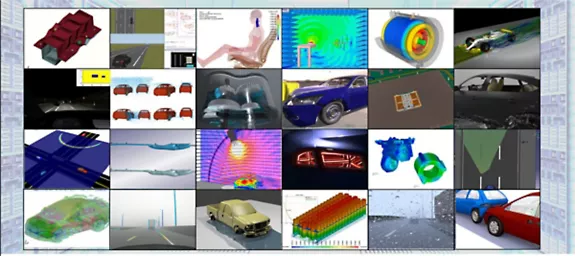Automotive Development Gets a Real Boost from Ansys Gateway Powered by AWS
Automotive engineering often calls for intensive, complex models to analyze aerodynamics, durability, safety, electric powertrain, autonomous system reliability, and more. Running simulations on these models requires enormous compute resources. To overcome this challenge, engineers will typically run on-premises, high-performance computing (HPC) clusters, which require large, upfront expenditures and can quickly become obsolete. Faster time to market is key to success, putting pressure on engineering teams to deliver.
An alternative solution is to run these simulations on the latest hardware in the cloud and only pay for what you use. Ansys partnered with leading cloud service provider Amazon Web Services (AWS) to offer Ansys Gateway powered by AWS, a new cloud platform that enables automotive customers to easily and efficiently run simulations in the cloud — a service with the potential to profoundly impact automotive manufacturing.
Solving Power and Performance Challenges in a Requirement-Sensitive Environment
One of the biggest obstacles automotive engineers face when tackling their simulation workloads is the lack of available hardware resources, creating an additional source of pressure for them as they navigate and identify solutions. This challenge often involves identification of, and access to, state-of-the-art computer-aided engineering (CAE) tools needed to complete their work, which can address strict requirements for automotive reliability and safety. Another challenge involves the lack of resources available to support simulation in an HPC environment. Any constraints, whether software- or hardware-related, can negatively impact end-user work, distracting engineers from the task at hand: vehicle engineering.
As an engineer, you can address this IT challenge in one of two ways. You can either purchase an often-expensive, quickly outdated (after around three years) HPC cluster, or you can use a combination of HPC cluster, workstation, and the cloud (perpetually refreshed) for a more optimized solution. Ansys software delivers an alternative approach to this challenge through multiple application-specific solvers accessible in the Ansys Gateway powered by AWS cloud environment.

Figure 1. Example of automotive use cases with intensive workloads.
Most automotive use cases today require intensive software and hardware use in an HPC environment, such as structural safety challenges like structural durability; noise, vibration, and harshness (NVH); and crash worthiness. These simulations involve extremely large computational models with hardware-intensive computation of transient analysis — all of which have experienced a monumental model size increase in the past 30 years. All enable hundreds of virtual test scenarios automakers need to evaluate and comply with industry and government safety regulations.
To address other challenges in automotive design, there has been a similar surge in demand from engineers for accuracy and computational power during analysis. For example, addressing aerodynamic challenges such as drag reduction, fuel economy, and electric vehicle (EV) range calls for extremely large computation models with full transient analysis of 10 second flow times. This requires days of runtime on an HPC cluster, a long job queue waiting for days, and a new target for graphics processing unit (GPU) computing.
Of course, additional challenges related to electric- and software-defined vehicles are also worth mentioning, as they involve electromagnetic susceptibility, compliance and safety regulations, and propulsion system analyses that often use hundreds of M Elements model sizes with multibounce raytracing. They are extremely RAM-intensive calculations and are ideal candidates for GPU computing.
Ansys simulation software helps to address these and other automotive development challenges all while accelerating time-to-market, improving efficiencies, and reducing cost in the process. By leveraging Ansys Gateway powered by AWS, many Ansys solvers can be scaled linearly with respect to time and core count; unlocking the ability to run on thousands of cores to drastically reduce solve times without impacting cost or requiring a heavy hardware investment to run them.
Ansys Gateway Powered by AWS Removes Roadblocks to Automotive Product Development
Setting up an HPC Cloud configuration is tedious and time consuming. Ansys takes care of this workload to ensure a simple and efficient experience. In Ansys Gateway powered by AWS, customers can access an ecosystem of Ansys applications, including some that are preconfigured for easy deployment, and leverage Ansys expertise in packaging and configuring virtual desktop interface (VDI) and HPC clusters.

Figure 2: Ansys Gateway powered by AWS: Pre-configured applications.
Deployment made easy: With approved and benchmarked specifications for quick deployment on AWS hardware, getting started is easy. You can also manually install third-party and in-house tools within the same environment for end-to-end CAD and CAE workflows.
Pay-as-you-go plans for cloud hardware to democratize access: All vehicle programs must work within budgetary constraints, which is why Ansys Gateway powered by AWS enables you to leverage any existing Ansys licenses and includes virtual machine (VM) charges based on your negotiated agreement with AWS.
Customer-driven, fully customizable solutions: Ansys Gateway powered by AWS is a fully customizable virtual command center that enables the storage of virtual machine configurations for easy and on-demand deployment by end users. It also helps you manage access to workspaces, VMs, and budgets through a single platform available directly within your web browser.

Figure 3. Workspace management in Ansys Gateway powered by AWS.
Avoiding Speed Bumps to Scalability and Runtime Acceleration with Ansys
With major preconfigured and benchmarked Ansys applications, Ansys Gateway powered by AWS supports most existing workflows, offering simplicity of use and a cost-effective way to use CAE/CAD on the cloud. You can see significant performance gains using Ansys Gateway powered by AWS, as AWS is perpetually refreshing hardware instances to deliver the best performance. Ansys is constantly testing new instances to discover which is delivering the best cost/performance ratio for different solvers. The result of this activity is very high scalability and significant runtime accelerations compared to traditional on-premises solutions.

Figure 4. Example of headlamps using Ansys Speos on the Cloud.
This content was first published on the Ansys website.

